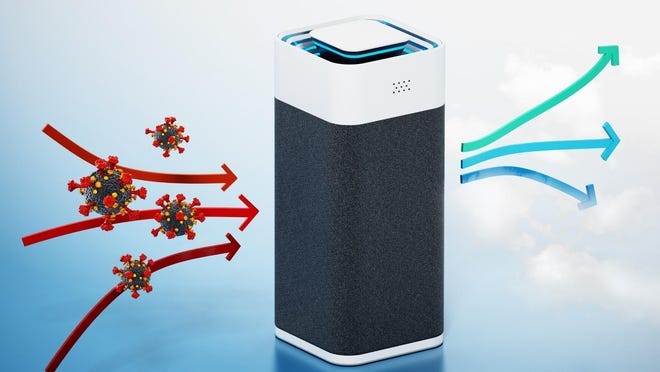What are the Best Air Purifiers for Viruses?

Buying an air purifier can be a big purchase. This is something that you will want to get right, especially if you suffer from airborne allergens or are prone to respiratory infections. If you want protection against viruses, it is highly important to read the specs before you buy. You will want to look for a MERV rating (minimum efficiency reporting value). If the MERV rating is not listed, there should be statements that indicate the smallest size of particle that the filter captures, as well as the proportion of total particulate in the air that it will capture. The best air purifiers for viruses will use either a HEPA filter, or a UV chamber filter – also known as VIRUSKILLER™.
The HEPA Filter, The MERV Rating and Other Key Specs
HEPA, or high efficiency particulate air, filters use very fine membranes to capture particles in the air. When particles travel through the filter, they are forced into lines. These lines of particles then become trapped inside. Because this technology relies on trapping clusters of particles, the downside is that single, isolated particles can sometimes pass through the membrane and not get trapped. A high quality HEPA filter will allow for only 3% of particles in the air to go uncaptured. When finding the right air purifiers for viruses, it is all about finding a HEPA filter that can capture particles of the right size.
Airborne particle sizes are measured in microns. Viruses are generally 0.2 microns in size. The overall filter performance is measured by its MERV rating. The filter’s MERV rating will tell you the minimum size of particle that the filter will capture and indicate the percentage of isolated particles that will get through undetected. The higher the number, the better the performance the filter will have. Generally, anything rated 13 or higher will capture viruses, so any purifiers that use a filter of this rating will be adequate air purifiers for viruses.
It is also important to be aware of some deceiving labels out there. If a purifier claims to use a true HEPA filter, this has a very specific technical meaning. A true HEPA filter captures 97% of airborne particulate down to 0.2 microns in size. This is an excellent performance, as many HEPA filters will only capture up to 85% of the 0.2 micron size particles. Avoid products that say “HEPA-like filter.” The words HEPA-like do not mean anything specific and this designation is not subject to the same performance and quality control standards of an authentic HEPA filter. A purifier that uses this filter type would not be one of the right air purifiers for viruses.
VIRUSKILLER™ and its Effectiveness
VIRUSKILLER™, also known as a UV chamber filter, is a type of air purifier that uses UV light rays to kill pathogens. The UV light rays activate a process that triggers the production of hydroxyl radicals. Hydroxyl radicals are gases that have the ability to eradicate pathogens completely. They destroy the mechanisms that bacteria and viruses use to replicate, and they also change the outer membrane structures used to bind to host organisms. Because no airborne pathogen is capable of surviving hydroxyl a radical exposure, VIRUSKILLER™ does not have the same performance limitations as a HEPA filter – there is no percentage of pathogen that can go undetected through a UV chamber filter. This high level of effectiveness is what makes UV chamber filters among the very best air purifiers for viruses.
If you are looking for an air purifier that can get rid of airborne viruses, you will want one with either a true HEPA filter, or a UV chamber filter. The true HEPA filter is good because it removes the harmful particles from the air. Its downside is that it does not capture all of the pathogens and it does not disinfect the air. The very best air purifiers for viruses are UV chamber filters, or the VIRUSKILLER™, because these can disinfect the air with 100% efficacy. If your top priority is to live virus free, there is no other alternative.

